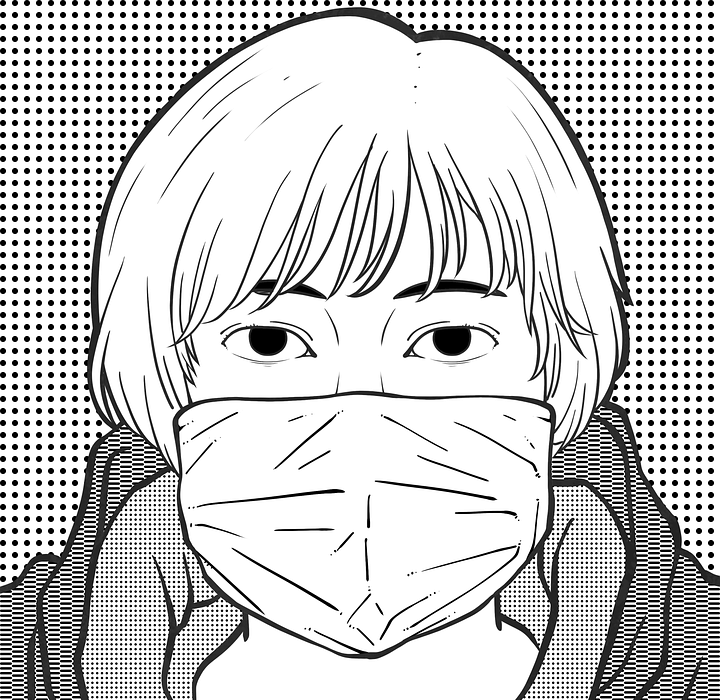As a dog owner, you know the drill: winter rolls around, and suddenly everyone's sniffling, coughing, and feeling generally miserable. And you can't help but wonder, "Could my furry friend be feeling under the weather, too?" While it's a natural concern, the truth is a bit more nuanced. Dogs can't catch the same human flu that sends us scrambling for tissues and hot toddies. However, they have their own versions of the flu virus, which can make them sick.
This article is your guide to understanding canine flu, from the different types and how they spread to what you can do to protect your pup. We'll debunk some common myths, answer your burning questions, and share some personal experiences to make this information as relatable as possible. Let's dive in!
(Part 1) The Flu – A Human Perspective

What is the Flu?
Before we talk about canine flu, let's get on the same page about the flu that affects us humans. The flu, or influenza, is a respiratory illness caused by a virus that spreads easily from person to person. It's known for causing a whole host of unpleasant symptoms like fever, chills, cough, sore throat, runny nose, muscle aches, and fatigue. Think of it as your body's way of saying, "Hey, I need a break!"
How Does the Flu Spread?
The flu virus spreads through tiny droplets of saliva or mucus that get released into the air when someone coughs, sneezes, or even talks. These droplets can travel up to six feet and land on surfaces or be inhaled by others. That's why covering your mouth when you cough or sneeze is so important! You can also get the flu by touching a surface with the virus on it and then touching your mouth, nose, or eyes. Think of it like a game of "flu tag" that you really don't want to play.
Can Dogs Get the Human Flu?
Now, here's a common question that often pops up: Can dogs catch the human flu? The answer is a resounding no! The flu virus is specific to humans. It's like a special key that only fits the lock on our cells, not on a dog's cells. So, no matter how many times your dog gives you those big, sad eyes, they're safe from catching your cold.
Think of it this way: your dog is immune to the human flu virus, just like you're immune to, say, distemper, a serious viral disease that affects dogs but not humans. It's all about that specific key-and-lock relationship!
(Part 2) Canine Flu: A Dog's Perspective

What is Canine Flu?
While dogs can't catch the human flu, they can get their own versions of the flu virus, known as canine influenza. Canine influenza is caused by a virus that specifically affects dogs. It's not the same virus as the human flu, so you don't have to worry about catching it from your dog, and your dog won't catch it from you. That's a relief, right?
Types of Canine Flu
There are two main types of canine influenza:
- Canine influenza virus (CIV): This is the original canine flu virus. It was first identified in greyhounds in 1970 and is thought to have originated from an avian influenza virus. CIV usually causes mild to moderate respiratory illness in dogs. Think of it as a slightly stuffy nose and a mild cough.
- Canine influenza virus type 2 (CIV2): This is a more recent strain of canine flu that emerged in 2015. It's more contagious than CIV and can cause more severe illness, with symptoms that can linger longer. Think of it as a more intense version of the flu, with more coughing and a potential for complications.
How is Canine Flu Spread?
Canine influenza is spread through direct contact with infected dogs, or through contact with contaminated surfaces. This could be anything from sharing a water bowl to playing with the same toy. It can also spread through the air when infected dogs cough or sneeze. So, if your dog's playing with another dog who happens to be carrying the virus, it's like a tiny airborne sneeze party.
Think of it like this: Just as you wouldn't want to share your toothbrush with someone who's sick, you wouldn't want your dog to share their toys or water bowls with a dog that's infected.
(Part 3) Recognizing the Signs of Canine Flu

So, how do you know if your dog has canine flu? The symptoms can be similar to other respiratory infections, but there are some key things to look out for. Here are the most common signs:
Common Symptoms:
- Coughing: This is often the first sign of canine flu. It can be a dry cough or a wet, hacking cough. Think of it as a persistent cough that just won't quit.
- Sneezing: Dogs with canine flu may sneeze frequently, often accompanied by a clear or white nasal discharge. Think of it as their version of blowing their nose, but they can't exactly reach for a tissue.
- Runny nose: A runny nose is another common symptom of canine flu. The discharge can be clear, white, or yellow. Imagine your dog constantly having a sniffly nose.
- Fever: Dogs with canine flu may have a fever, which can be a sign of a more serious infection. They might feel warm to the touch, and their energy levels might be lower than usual.
- Lethargy: Dogs with canine flu may be tired and sluggish. They may not want to play or go for walks. Think of it as your dog needing a nap after a big, long sniffle.
- Loss of appetite: A decrease in appetite is another common symptom of canine flu. This might be a sign that your dog's not feeling well and their stomach isn't cooperating.
- Difficulty breathing: In some cases, dogs with canine flu may have difficulty breathing. This is a serious symptom and requires immediate veterinary attention. If your dog is having trouble breathing, don't hesitate to get them to the vet right away.
Keep in mind that not all dogs will show all of these symptoms. Some dogs may only have mild symptoms, while others may have more severe illness. If you’re concerned about your dog’s health, it’s always best to contact your veterinarian. They can help determine if your dog has canine flu and advise you on the best course of action.
(Part 4) Protecting Your Dog from Canine Flu
Now that you know about canine flu, you're probably wondering, "How can I keep my dog safe?" The good news is that there are steps you can take to reduce their risk. Here's what you can do:
Vaccination
One of the best ways to protect your dog from canine flu is to vaccinate them. Canine flu vaccines are available for both CIV and CIV2. The vaccine is given as an injection and is generally well-tolerated by dogs. Think of it as a little shot that gives your dog an extra layer of protection.
Vaccination is especially important for dogs who are at increased risk of exposure to canine flu, such as:
- Dogs who attend dog parks or other public places where they may come into contact with other dogs.
- Dogs who participate in dog sports or other activities where they may be exposed to other dogs.
- Dogs who travel frequently.
Remember, even vaccinated dogs can still get canine flu, but they are less likely to get sick or develop severe symptoms. Think of the vaccine as a safety net, giving your dog an extra boost against the virus.
Preventative Measures
Vaccination isn't the only line of defense. Here are some additional preventative measures you can take:
- Wash your hands: Wash your hands thoroughly with soap and water after handling your dog, especially if you have been in contact with other dogs.
- Clean your dog’s belongings: Clean your dog’s food and water bowls, toys, and bedding regularly to remove any viruses.
- Limit contact with other dogs: If possible, limit your dog's contact with other dogs, especially if you know there is a canine flu outbreak in your area.
- Avoid crowded areas: Try to avoid taking your dog to crowded areas, such as dog parks or pet stores, especially during flu season.
- Isolate your dog if they are sick: If your dog is sick, isolate them from other dogs and humans to prevent the spread of infection.
By taking these precautions, you can significantly reduce your dog’s risk of getting canine flu. Think of it as a team effort to keep your pup healthy and happy.
(Part 5) Treating Canine Flu
If your dog does get canine flu, don't panic! Most dogs recover fully with supportive care. Here's what you can do to help your furry friend feel better:
Supportive Care
- Rest: Give your dog plenty of rest and quiet time to recover. Think of it as a "sick day" for your dog. They need time to heal and recharge their batteries.
- Hydration: Ensure your dog is drinking plenty of water to stay hydrated. Encourage them to drink by offering them water in different bowls or using a water fountain. Imagine it as a little sip of sunshine to help them feel better.
- Medications: Your veterinarian may prescribe medications to help relieve your dog’s symptoms, such as cough suppressants, pain relievers, or antibiotics if a secondary bacterial infection develops.
- Nutritious food: Offer your dog a nutritious diet to help them regain their strength. Think of it as giving them the fuel they need to fight off the virus.
Keep a close eye on your dog’s condition and contact your veterinarian if you notice any worsening symptoms, such as difficulty breathing, lethargy, or loss of appetite. It's always better to be safe than sorry when it comes to your dog's health.
(Part 6) Common Myths and Misconceptions
There are many misconceptions surrounding canine flu, and it's important to set the record straight. Here are some common myths and misconceptions:
Canine Flu is a Death Sentence
This is not true! While canine flu can be serious, most dogs recover fully with proper care. Think of it as a temporary setback, like a sniffle that eventually fades away. However, it's important to remember that some dogs, especially those with compromised immune systems or pre-existing health conditions, may be at higher risk of complications.
Dogs Can Catch the Flu from Humans
As we mentioned earlier, this is false! Canine flu is caused by a different virus than the human flu, so dogs can't catch it from humans, and vice versa. It's like two completely different worlds, with their own sets of viruses.
Canine Flu is Highly Contagious
This is partially true. Canine flu is indeed contagious, but not as contagious as some other respiratory infections. Think of it as a little bit more cautious than a regular cold. It's important to take preventative measures, but don't let fear consume you.
My Dog Will Get Canine Flu If It's Vaccinated
Another false statement! Vaccination does not cause canine flu. It actually helps to protect your dog from getting sick. While vaccinated dogs can still get canine flu, they are less likely to get sick or develop severe symptoms. Think of it as a little shield of protection for your pup.
Canine Flu is Only Found in Certain Regions
This isn't entirely true! Canine flu has been reported in various regions across the world. It's important to stay informed about any potential outbreaks in your area and take precautions to protect your dog.
By separating fact from fiction, you can make informed decisions about your dog's health and wellbeing.
(Part 7) Living with Canine Flu: A Personal Story
I’ve had my share of close calls with canine flu. A few years back, there was a big outbreak in my area. My dog, a playful golden retriever named Buddy, was fully vaccinated, but he still came into contact with an infected dog at the dog park. Buddy started showing some mild symptoms, like a cough and a runny nose. Being a worrier, I rushed him to the vet, who confirmed it was canine flu.
The vet prescribed some medication and recommended keeping Buddy quarantined for a few days to prevent further spread. It was a tough few days for Buddy, as he was used to being the social butterfly of the dog park. He was grumpy and bored, but I made sure he was comfortable and had plenty of cuddles. To my relief, Buddy recovered fully within a week.
This experience taught me the importance of vaccination and the need to be prepared. I learned that canine flu is a real threat, but it doesn’t have to be a scary one. With proper care and preventative measures, our canine companions can stay safe and healthy.
(Part 8) A Word of Advice from a Dog-Loving Editor
Canine flu is a common concern for dog owners, but don't let it scare you. Remember, you are not alone. By understanding the basics of canine flu, taking preventative measures, and staying informed, you can help ensure your furry friend’s health and happiness.
Always consult with your veterinarian if you have any questions or concerns about your dog’s health. They are your best resource for keeping your dog safe and healthy.
FAQs
Q1. How long is a dog contagious with canine flu?
A dog with canine flu is generally contagious for about 5-10 days, but they can continue to shed the virus for up to 3 weeks. That's why it's important to keep your dog isolated during this time to prevent the spread of infection. Think of it like a "flu quarantine" for your dog.
Q2. Is canine flu fatal?
While canine flu can be serious, it is rarely fatal in healthy dogs. However, some dogs, especially those with compromised immune systems or pre-existing health conditions, may be at higher risk of complications. That's why it's important to pay attention to your dog's health and seek veterinary care if you notice any worrisome symptoms.
Q3. Can I give my dog human flu medication?
No! It's dangerous to give your dog human flu medication. Some human medications can be toxic to dogs. Always consult with your veterinarian before giving your dog any medications. Remember, you want to help your dog, not harm them.
Q4. How can I find a canine flu vaccine for my dog?
You can talk to your veterinarian about getting a canine flu vaccine for your dog. They can help determine if your dog needs the vaccine and can administer it.
Q5. What should I do if I think my dog has canine flu?
If you think your dog might have canine flu, it's important to contact your veterinarian immediately. They can examine your dog and recommend the appropriate course of treatment.
Stay safe and healthy, you and your furry friends!
Everyone is watching
-

Can Dogs Eat Bananas? A Guide to Safe Treats
DOGS & PUPPIESThis comprehensive guide will delve into the world of canine nutrition, focusing on the popular question: can ...
-

Can Dogs Eat Oranges? (Is It Safe or Toxic?)
DOGS & PUPPIESThis article delves into the question of whether dogs can safely consume oranges. We'll explore the nutrition...
-

Can Dogs Eat Grapes? The Shocking Truth About This Fruit
DOGS & PUPPIESThis article delves into the controversial topic of grapes and dogs, exploring the potential dangers associate...
-

Why Do Dogs Eat Poop? Understanding Coprophagia in Dogs
DOGS & PUPPIESThis article delves into the perplexing phenomenon of coprophagia, the act of eating faeces, in dogs. We explo...
-

Can Dogs Eat Shrimp? A Guide to Safety and Risks
DOGS & PUPPIESThis comprehensive guide dives into the world of shrimp and dogs, exploring the potential benefits and risks a...
